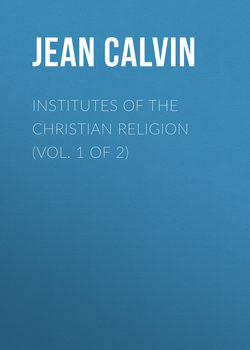Читать книгу Institutes of the Christian Religion (Vol. 1 of 2) - Calvin Jean, Jean Calvin - Страница 1
Advertisement
ОглавлениеThe Presbyterian Board of Publication, in introducing to the public a new edition of the inimitable “Institutes of the Christian Religion,” do not wish to be regarded as adopting all the sentiments and forms of expression of the venerated writer; although they agree with him in his general views, and admire the skill and learning with which he has pointed out the relative positions and bearings of the great doctrines of revelation. Calvin was better qualified than any of his contemporaries, to present revealed truth in a connected and systematic form. His great natural abilities, his profound erudition, his well balanced and discriminating judgment, and his habits of diligent investigation, eminently fitted him to prepare such a work as the “Institutes,” in which the doctrines of the gospel are so clearly developed and harmonized, that the system has been closely associated with his name, from the period of its publication until the present time.
The honour of Calvin consisted, not in suggesting ingenious theories and speculations, but in his general accuracy in interpreting the Holy Scriptures, and in detecting and pointing out the connection of Scripture doctrines, which, instead of being insulated, were shown to occupy their respective places in forming a complete and perfect system of Divine truth. The doctrines embraced in the formularies of the Presbyterian Church are termed Calvinistic, from their general accordance with Calvin's interpretation of scriptural truth; but the admission of this term, as explanatory of their general character, is not understood as by any means implying an entire coincidence in the views of Calvin, or a submission to his authority as an umpire in theological controversies. Although a learned and pious, he was a fallible man; and his opinions, although deserving of profound respect, are not to be blindly followed.
While admitting that the “Institutes,” considering the times and circumstances in which they were written, form an invaluable body of divinity, still it must be acknowledged, that some of the doctrines therein maintained have been more luminously set forth in modern times. We would especially mention as an instance the doctrine of justification through the imputed righteousness of Christ. Some of the expressions of Calvin on the subject of reprobation may be regarded as too unqualified, and we can no further endorse them than as they are incorporated in the Presbyterian Confession of Faith. The most decidedly objectionable feature in the “Christian Institutes,” is to be found in the explanation of the Fourth Commandment, where the author asserts the abrogation of the Sabbath. In Calvin's view, this ordinance was a mere type of better blessings, and, with the types and ceremonies of the old dispensation, was done away by the introduction of a new and better dispensation. In this opinion there can be no doubt that he greatly erred; and so universal is the conviction of the Church on the perpetual obligation of the Sabbath as a moral institution, that no danger is to be apprehended from a contrary view, even under the sanction of so great a name as that of Calvin. In justice to his opinion on this subject, however, it should be stated, that he distinctly recognized not only the propriety but the necessity of a consecration of stated days for public religious services, without which regulation, he declares that “it is so far from being possible to preserve order and decorum, that if it were abolished, the Church would be in imminent danger of immediate convulsion and ruin.” It is much to be lamented that so great a mind should have been led astray on so important a point by attempting to avoid an opposite extreme.
The Board of Publication have been induced to undertake this edition, by the very generous offer of the First and Second Presbyterian Churches in Baltimore, of which the Rev. John Backus and the Rev. Dr. R. J. Breckinridge are respectively Pastors, to defray the expense of stereotyping the work. Under the direction of the Executive Committee of the Board, the translation has been diligently compared throughout with the original Latin and French, and various corrections have been made to convey the meaning of the author more distinctly and accurately. This laborious duty has been performed by a member of the Publishing Committee. The intrinsic excellence of the work, taken in connection with the attractive style, and comparative cheapness, of the present edition, induces the Committee to hope, that it may be widely circulated and carefully studied, both by the clergy and laymen of the Presbyterian Church.
In behalf of the Executive Committee,
William M. Engles, Editor.
